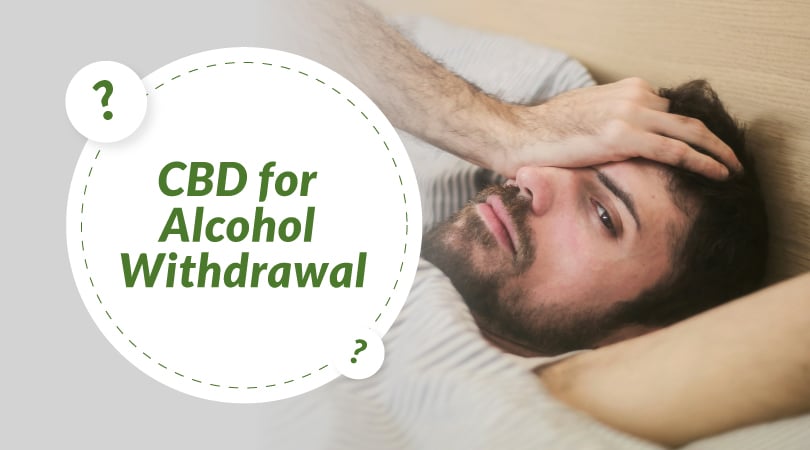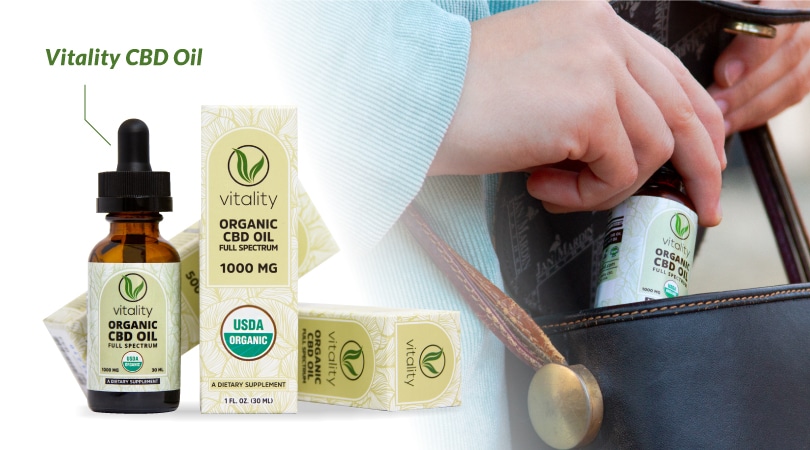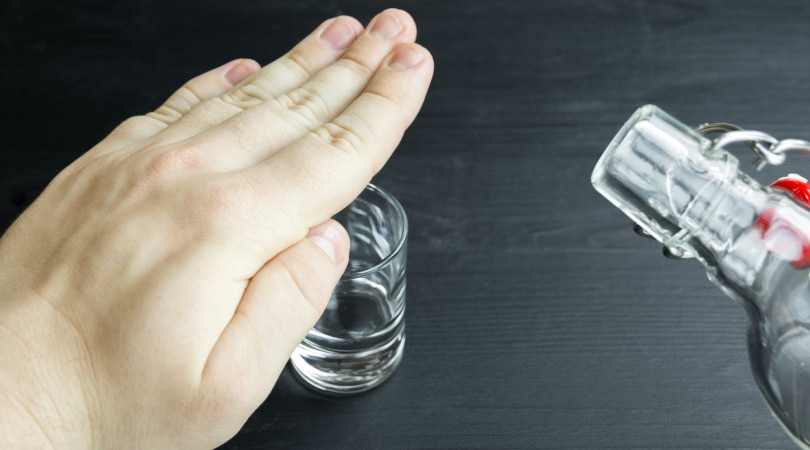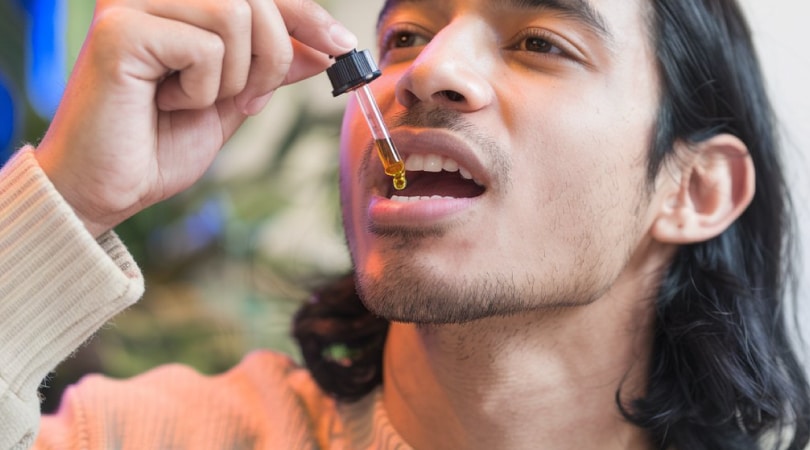
CBD for Alcohol Withdrawal: Can It Help?
Alcohol withdrawal is a serious condition, and symptoms can range from mild to life-threatening complications. For those who struggle with alcohol addiction, seeking help is a difficult but vital step.
According to the 2023 National Survey on Drug Use and Health, over 16 million people in the U.S. reported heavy alcohol use, which is defined by SAMHSA (Substance Abuse and Mental Health Services Administration) as “binge drinking on 5 or more days in the past month.” With such a widespread impact, the search for alternative treatments continues to evolve.
One area gaining attention is the relationship between CBD (cannabidiol) and alcohol withdrawal. But how could CBD play a role in easing withdrawal symptoms? Let’s explore the potential benefits early research is showing, the recommended dosage, and even how you could use CBD to stop drinking.
Common Alcohol Withdrawal Symptoms
The symptoms of alcohol withdrawal can vary but may include:
- Anxiety: Feeling nervous or on edge is a frequent symptom as the body reacts to the absence of alcohol.
- Tremors: Uncontrollable shaking, especially in the hands, often occurs within hours of stopping alcohol intake.
- Nausea and Vomiting: Many experience an upset stomach and vomiting during withdrawal, which can lead to dehydration.
- Headaches: Alcohol withdrawal often triggers severe headaches due to dehydration and chemical imbalances in the brain.
- Sweating: Excessive sweating is common, even in a cool environment, due to the body’s overactive stress response.
- Insomnia: Difficulty falling or staying asleep is typical during alcohol withdrawal.
- Irritability: Mood swings and irritability are common as the brain adjusts to functioning without alcohol.
- Hallucinations: In severe cases, people may experience visual or auditory hallucinations.
- Seizures: Some may face the risk of seizures.
- Delirium Tremens (DTs): A severe form of withdrawal causing confusion, rapid heartbeat, and fever; it requires immediate medical attention.
What Is CBD Oil?
CBD oil is a compound extracted from the hemp plant. It’s non-psychoactive, meaning it won’t make you feel “high”. CBD is one of the most popular cannabinoids and it is currently being studied for its potential benefits for various health conditions.

Does CBD Help with Alcohol Withdrawal Symptoms?
Studies on CBD and alcohol withdrawal are still in the early stages, but here’s what initial research shows:
CBD for Withdrawal Symptoms in the Liver and Brain
One of the main worries of people going through alcohol withdrawal is the long-term effects on their liver and brain, which are some of the most impacted organs by alcohol-heavy use.
CBD has been linked to potential benefits in preventing and counteracting liver and brain issues stemming from alcohol use.
A 2017 study explored how CBD can protect the liver from alcohol-related damage in mice. Researchers found that CBD could reduce liver inflammation, oxidative stress, and fat buildup caused by excessive alcohol intake.
By regulating key liver enzymes and reducing harmful immune responses, CBD may have the potential to reduce liver steatosis (fatty liver disease) and improve metabolic function in the liver.
Additionally, a 2019 systematic review looked at CBD’s potential as a treatment for Alcohol Use Disorder (AUD). The review included 8 studies made in mice, 3 in healthy adults, and 1 in a cell culture.
Findings from animal models showed that CBD could protect the brain from alcohol’s harmful effects, particularly by preventing hippocampal damage. Additionally, CBD could reduce alcohol cravings and withdrawal symptoms in rodents.
Also, this 2019 review explored how CBD could reduce both alcohol consumption and the damage alcohol causes to the liver and brain. The results showed that CBD could potentially decrease lipid accumulation in the liver and reduce inflammation, protecting the liver from alcohol-induced steatosis.
CBD to Stop Drinking
Alcohol withdrawal symptoms can be difficult to shrug off, and more often than not, lead to a relapse. That’s why CBD is being researched as a possible tool to help reduce alcohol consumption.
In 2018, a study on mice explored how a CB1 receptor antagonist (a type of blocker targeting CB1 receptors, which are part of the endocannabinoid system and play a role in cognitive and emotional processes) affects binge drinking behavior.
The researchers mentioned that blocking the CB1 receptor could lead to a reduction in both alcohol consumption and dopamine release, which are typically associated with binge drinking.
Although the study didn’t directly examine CBD, it highlighted the involvement of the endocannabinoid system in alcohol consumption, suggesting that CBD’s interaction with this system could potentially help reduce binge drinking.
One telling report is this 2020 cross-sectional survey of Canadian participants who took medical cannabis that revealed that out of 973 respondents, 44% noted a drop in how often they consumed alcohol over the past 30 days, 34% decreased their weekly alcohol consumption, and 8% did not consume any alcohol during that time frame.
Added to that, in a 2023 review of preclinical and clinical studies on CBD and substance use disorder (SUD), researchers highlighted that since CBD is already being studied for its potential benefits in neurological conditions like epilepsy, multiple sclerosis, and Parkinson’s, it could have the potential to help with SUD.
The review discusses how CBD could affect cravings, motivation, and withdrawal symptoms related to drugs like alcohol, opioids, nicotine, and stimulants. It also focuses on how CBD interacts with brain systems related to addiction, such as dopamine and serotonin. These preliminary findings can suggest its potential in treating substance use disorder (SUD).

CBD for Alcohol Withdrawal Insomnia
Sleep problems are recurrent in people who are going through alcohol withdrawal. Although no studies have been done on CBD and insomnia resulting from alcohol withdrawal, there are several studies that have explored the potential benefit of CBD for various types of insomnia.
In 2023, this review analyzed studies on CBD’s potential to treat insomnia, searching various databases up to December 29, 2021. A total of 34 studies were included, with most showing some potential improvement in insomnia symptoms. Of these, 19 studies focused mainly on CBD, and 21 used a nearly equal mix of CBD and THC.
CBD for Alcohol Withdrawal Anxiety
If you are going through alcohol withdrawal, you might be experiencing anxiety and other mental health issues. And that’s precisely where CBD has shown promising potential to help you through this process.
In 2023, a study focused on CBD’s effect on spontaneous alcohol withdrawal (SAW) in mice. The results suggested that CBD could reduce anxiety-like behavior and somatic withdrawal symptoms. Plus, there are broader studies that research how CBD could help alleviate different types of anxiety and its symptoms.
Taking CBD Oil for Alcohol Withdrawal
CBD oil may be a potential ally in managing alcohol withdrawal symptoms. It interacts with the body’s endocannabinoid system, which helps regulate mood, stress, and inflammation.
We recommend you purchase it from a trusted provider, so it’s easier to measure and control the dosage. Full-spectrum CBD oil, which contains other beneficial cannabinoids, can help you experience the potential benefits of the entourage effect.
However, it’s important to note that CBD isn’t a cure for alcohol withdrawal and should be used alongside medical supervision for best results.
How to Take CBD Oil (Step by Step and Recommendations)
1. Start with a Low Dose
Begin with a small amount of CBD oil, typically between 10-20 mg, and assess how your body reacts over the course of a few days.
2. Increase Gradually
If you feel the need for stronger effects, gradually increase your dosage by 5-10 mg every week until you find the right balance.
3. Use a Dropper
Place the recommended dose under your tongue using the dropper and hold it there for about 30-60 seconds before swallowing. This allows for faster absorption into the bloodstream.
4. Be Consistent
Take your CBD oil at the same time every day for consistency. This helps your body adjust to its effects over time.
5. Monitor Your Progress
Track how your symptoms are evolving, and if needed, consult a healthcare professional to adjust your dose.

FAQs
What is the Best CBD Oil to Use for Alcohol Withdrawal?
The best CBD oil for alcohol withdrawal is Full-spectrum CBD oil. This type of oil is rich in a range of cannabinoids, terpenes, and other compounds found in the cannabis plant that work together to produce their particular effects.
What’s the Best CBD Dosage for Alcohol Withdrawal?
Generally, it’s best to start low and adjust the dose based on your body’s response, as the appropriate CBD dosage can vary based on individual needs.
A general starting point is 10-20 mg of CBD daily, and then gradually increase the dosage by 5-10 mg as needed. Some people may require doses of 50-100 mg per day.
Does CBD Have any Side Effects?
CBD is generally well-tolerated, but some users may experience mild side effects such as drowsiness, and dry mouth. These side effects are typically minor and tend to subside as the body adjusts to the supplement.
Can You Mix CBD and Alcohol?
Yes, you can mix CBD and alcohol, but it’s important to be cautious. Combining them may boost each other’s effects, potentially leading to increased drowsiness.
CBD vs. THC: Which Is Better for Alcohol Withdrawal?
There aren’t many studies on CBD and THC for alcohol withdrawal, however, a 2021 observational study examined the effects of CBD and THC on alcohol use among 120 participants around the age of 33 who consume both cannabis and alcohol.
The study results suggested that participants who used cannabis high in CBD drank less alcohol, had fewer drinking days, and engaged in less alcohol and cannabis co-use compared to those who used THC-heavy strains.
Can CBD Help with Alcohol Use Disorder (AUD)?
There is an upcoming study that will investigate whether Cannabidiol (CBD) could be an effective treatment for alcohol use disorder (AUD). It will be a double-blind, randomized trial, where participants will take 800 mg of CBD or a placebo over three days, with an 18-day break between treatments.
Researchers will monitor brain activity during alcohol-related tasks using fMRI, measure physical responses like heart rate and skin conductance, and assess brain chemical levels, cognitive function, and clinical outcomes such as cravings, anxiety, and sleep. The goal is to understand how CBD works and its potential in treating AUD.
Studies like this will help us better understand how CBD could help with alcohol use disorder (AUD).
CBD Oil vs CBD Edibles for Alcohol Withdrawal: Which is Better?
CBD oil is potentially better for alcohol withdrawal compared to edibles because of its faster absorption rate. When you take CBD oil sublingually (under the tongue), it enters the bloodstream quickly, offering more immediate effects.
Edibles, on the other hand, take longer to digest and metabolize, which means the effects are slower to kick in. Additionally, CBD oil allows for more precise dosage control, which is essential when you are first taking it.
In Conclusion
So, can CBD help with alcohol withdrawal? Studies suggest CBD oil shows promise as a helpful tool in managing alcohol withdrawal symptoms. Whether used to ease anxiety, reduce cravings, or support overall well-being, it’s important to choose high-quality, full-spectrum CBD oil from a reputable source.
Start with a low dose, monitor your symptoms, and adjust your intake as needed. Always consult a healthcare professional before integrating CBD into your withdrawal plan.
Ready to try CBD oil? Explore our range of full-spectrum CBD oil at Vitality to support your journey to better health!
References
De Ternay, J. et al. (2019). Therapeutic Prospects of Cannabidiol for Alcohol Use Disorder and Alcohol-Related Damages on the Liver and the Brain. Frontiers in pharmacology, 10, 627. https://doi.org/10.3389/fphar.2019.00627
Gasparyan, A. et al. (2023). Cannabidiol regulates behavioral and brain alterations induced by spontaneous alcohol withdrawal. Neuropharmacology, 233, 109549. https://doi.org/10.1016/j.neuropharm.2023.109549
Han, K. et al. (2024). Therapeutic potential of cannabidiol (CBD) in anxiety disorders: A systematic review and meta-analysis. Psychiatry Research, 339, 116049. https://doi.org/10.1016/j.psychres.2024.116049
Hurzeler, T. P. et al. (2024). The neurobehavioural effects of cannabidiol in alcohol use disorder: Study protocol for a double-blind, randomised, cross over, placebo-controlled trial. Contemporary Clinical Trials Communications, 41, 101341. https://doi.org/10.1016/j.conctc.2024.101341
Karoly, H. C. et al. (2021). THC and CBD effects on alcohol use among alcohol and cannabis co-users. Psychol Addict Behav, 35(6), 749-759. https://doi.org/10.1037/adb0000706
Lucas, P. et al. (2020). Reductions in alcohol use following medical cannabis initiation: results from a large cross-sectional survey of medical cannabis patients in Canada. International Journal of Drug Policy, 86, 102963. https://doi.org/10.1016/j.drugpo.2020.102963
Navarrete, F. et al. (2021). Role of Cannabidiol in the Therapeutic Intervention for Substance Use Disorders. Front Pharmacol. 2021 May 20;12:626010. https://doi.org/10.3389/fphar.2021.626010
Nona, C. N., Hendershot, C. S., & Le Foll, B. (2019). Effects of cannabidiol on alcohol-related outcomes: A review of preclinical and human research. Exp Clin Psychopharmacol, 27(4), 359-369. https://doi.org/10.1037/pha0000272
Ranum, R. M. et al. (2023). Use of Cannabidiol in the Management of Insomnia: A Systematic Review. Cannabis Cannabinoid Res, 8(2), 213-229. https://doi.org/10.1089/can.2022.0122
Turna, J. et al. (2019). Cannabidiol as a Novel Candidate Alcohol Use Disorder Pharmacotherapy: A Systematic Review. Alcohol Clin Exp Re, 43: 550-563. https://doi.org/10.1111/acer.13964
Wang, Y. et al. (2017). Cannabidiol attenuates alcohol-induced liver steatosis, metabolic dysregulation, inflammation and neutrophil-mediated injury. Scientific reports, 7(1), 12064. https://doi.org/10.1038/s41598-017-10924-8
